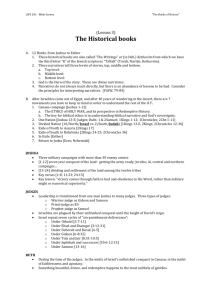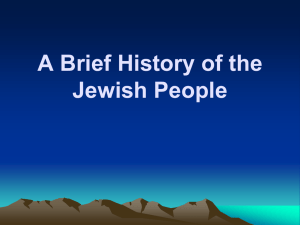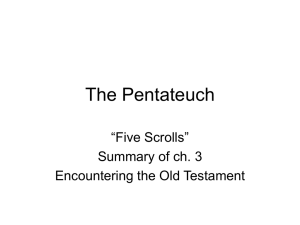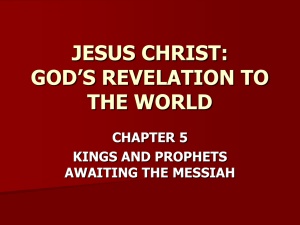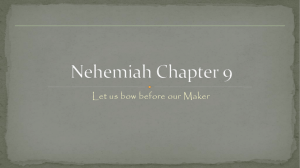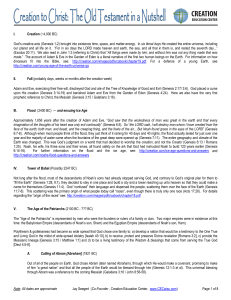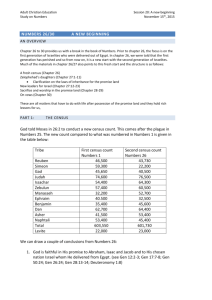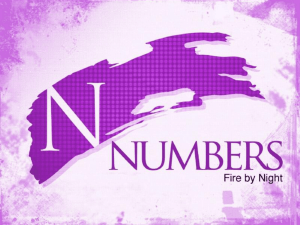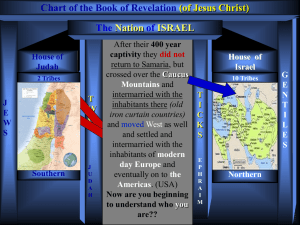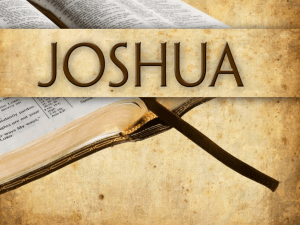Big Story Talking Points
advertisement
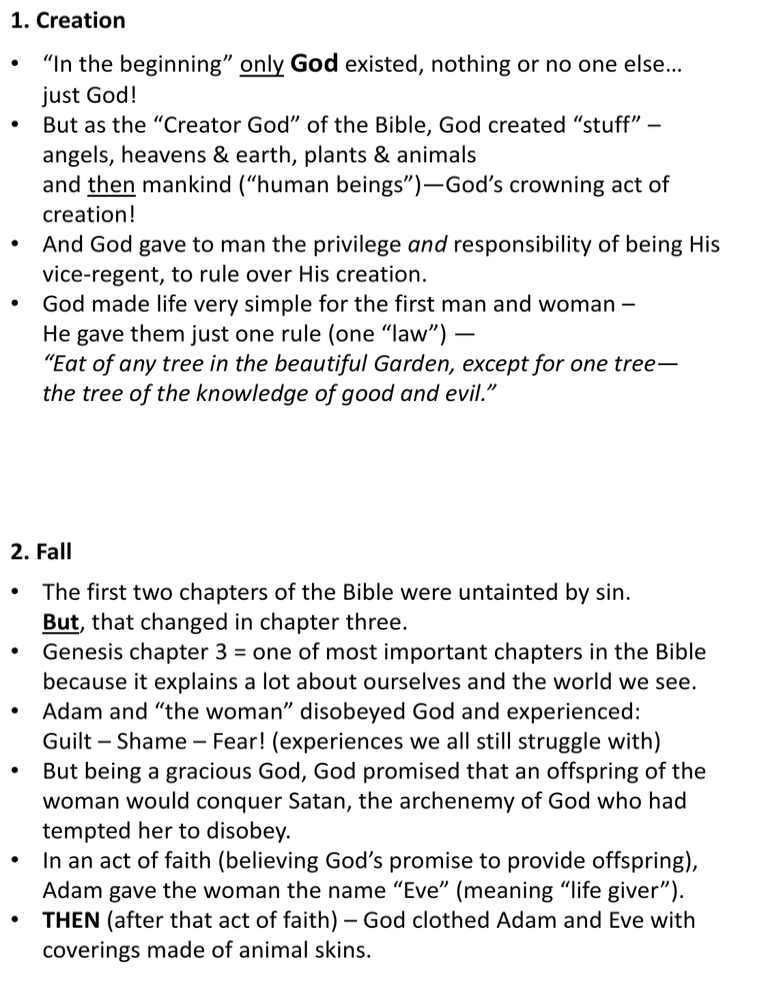
1. Creation • “In the beginning” only God existed, nothing or no one else… just God! • But as the “Creator God” of the Bible, God created “stuff” – angels, heavens & earth, plants & animals and then mankind (“human beings”)—God’s crowning act of creation! • And God gave to man the privilege and responsibility of being His vice-regent, to rule over His creation. • God made life very simple for the first man and woman – He gave them just one rule (one “law”) — “Eat of any tree in the beautiful Garden, except for one tree— the tree of the knowledge of good and evil.” 2. Fall • The first two chapters of the Bible were untainted by sin. But, that changed in chapter three. • Genesis chapter 3 = one of most important chapters in the Bible because it explains a lot about ourselves and the world we see. • Adam and “the woman” disobeyed God and experienced: Guilt – Shame – Fear! (experiences we all still struggle with) • But being a gracious God, God promised that an offspring of the woman would conquer Satan, the archenemy of God who had tempted her to disobey. • In an act of faith (believing God’s promise to provide offspring), Adam gave the woman the name “Eve” (meaning “life giver”). • THEN (after that act of faith) – God clothed Adam and Eve with coverings made of animal skins. 3. Flood • Some of us may think – “Oh, I wouldn’t have disobeyed!” But all of Adam and Eve’s children and grandchildren and great grandchildren disobeyed—they sinned! (and we do too!). • So by the time a man named “Noah” lived, the world was “exceedingly wicked” – so much so that God chose to destroy it. • But Noah found grace in God’s sight, because Noah was righteous and walked with God. • So God instructed Noah to build a huge boat (“ark”) – equal to the size of 500 rail road cars or 1500 semi-trailers today. It was the largest floating vessel ever until mid-19th century! • After Noah and representatives of all kinds of animals were safe inside the ark, God closed the door—to shut them in and to shut others out. • And in that way, God preserved the kinds of life He had created. 4. Babel • The descendants of Noah (who all spoke a common language) migrated to the land of Shinar, near the Euphrates River. • They said “Let’s 1build a city and a 2tower that reaches… and 3make a name for ourselves, LEST we be scattered….” • The tower was a zig-gu-rat – a stepped tower (many levels). The top was thought to be a “gateway of the gods.” • At bottom of tower was a temple, down to which the “gods” were supposed to descend to meet with the people. • But the true GOD (the God of the Bible) came down instead and He confused their language, which caused them to disperse all over the earth. • As they dispersed, these people carried with them their false ideas about “gods” wherever they went. 5. Patriarchs • Even though there were a lot of false god-views spreading throughout the world, the LORD God of the Bible was working to bring people back to Himself. • The focus in God’s plan turned to one man (“Abram” / “Abraham”)—from a family of moon-worshipers in Ur (near what is now the Persian Gulf). God called Abram to go to a land he had never seen—the land of Canaan. • And God promised to give this land to Abram’s descendants, as well as a very extensive family and some unique blessings. • Even though God promised an extensive family to Abram, he was 100 years old before his promised son (Isaac) would be born. • Isaac’s son Jacob was a deceitful man whose life God changed and gave the name “Israel”—who became the father of Judah, Joseph, and ten other brothers who were important to God’s plan. 6. Moses • Four books of the Bible tell us the story of the life and ministry of Moses. How… 1. God prepared him. 2. God called him to be a leader. 3. Moses led the Israelites out of Egypt (and parted the waters of the Red Sea to make that happen!) and through a great wilderness—journey that took much longer than expected! • BUT most important, how – 4. Moses taught the Israelites to… o Reverence the LORD God and worship Him o Offer substitute sacrifices to atone for their sins— personally and as a nation. 7. Joshua • When Moses died, the Israelites must have thought – “How will we ever replace him?!” But they didn’t have to—God would do that. • God spoke to Joshua, who had been Moses’ servant and said, “Just as I was with Moses, even so I’ll be with you!” • And God demonstrated His faithfulness to that promise: Just as God used Moses to part the Red Sea for the Israelites to cross on dry land, 40 years later God stopped the flooded Jordan River for the same purpose under Joshua’s leadership. • The story of Joshua’s leadership is divided into two sections in the book that bears his name: o Joshua led the Israelites in defeating the ungodly Canaanites nations who inhabited the promised land of Canaan. o Joshua wisely divided the land into 12 sections and distributed these to the twelve tribes of Israel. 8. Judges • The era of the judges was one of the darkest times in the life of the nation Israel—politically and spiritually. • For more than 300 years—several downward spiraling sin-cycles characterized this era: 1. The people would turn from the LORD God to worship idols. 2. God would send oppressors (Moabites, Midianites, Canaanites, etc.) to rob and intimidate them. 3. The people would cry to the LORD God for deliverance. 4. God would raise up “judges” to deliver them. But these so-called “judges” were local and generally not virtuous people. • But the last judge – Samuel was the best! He was a godly man who was well-respected by most all the people in the entire land. 9. Monarchy • “We don’t care how good a leader Samuel is,” the people must have said. They insisted on having a king “like all the other nations.” • So God gave them what they wanted—sort of. God didn’t give them a king-only monarchy, but He did give them a theocraticmonarchy—He would rule over them through a human king. • Saul, from the tribe of Benjamin, was head and shoulders taller than his peers and seemed like an obvious choice to be Israel’s first king, but flaws in his character gradually doomed him. • Then David, from the tribe of Judah—a not-so-obvious candidate to be king–proved to be Israel’s greatest king because He was a “man after God’s own heart.” God promised David that his dynasty would be an everlasting dynasty. • David’s son Solomon got off to a great start, but his commitment to the one true God faltered under the influence of pagan wives. 10. Division • Israel’s temporarily realized dream of 12 tribes united in one great kingdom began to deteriorate when Solomon pursued false gods. • But it was Solomon’s son Rehoboam who made the fatal mistake of listening to foolish advice. King Rehoboam’s decision to be more autocratic than his father resulted in a division of the kingdom. • Ten northern tribes followed Jeroboam as their king and became known as the “Northern Kingdom” or “Israel.” All 20 kings who ruled this Northern Kingdom were evil. • Rehoboam’s “Southern Kingdom” was left with only two southern tribes—Judah and Benjamin. It became known simply as the Kingdom of Judah, after the name of its more prominent tribe. • More than half of Judah’s kings were evil, but there were a few notable exceptions of good or godly kings. 11. Exile • But the worst was not over for Israel and Judah. Their continued slide into apostasy (“turning away from God”) eventually led to God’s judgment in the form of exiles for both kingdoms. • God was less patient with the Northern Kingdom, because of their long unbroken succession of evil kings. In 722 B.C. the mighty and fearsome kingdom of Assyria conquered Israel and scattered most of the Israelites throughout other parts of Assyria’s kingdom—never to return or be heard from again! • Beginning in about 605 B.C., Babylonians captured Judah and began to exile them in waves to Babylon. • But Jeremiah, a faithful prophet of God who remained in Jerusalem during most of the time of exile, predicted that the Jewish captives would return from exile after 70 years. 12. Return • As was just mentioned, those exiled from the Northern Kingdom by the Assyrians never returned! • But, just as Jeremiah had predicted, Jews from the Babylonian exile did begin to return in 536 B.C. o Zerubbabel led a group of about 50,000 Jews who returned from Babylon to Jerusalem to rebuild the temple. o Later, Nehemiah returned to Jerusalem to rebuild the city’s walls. o Ezra, a priest and scribe, returned to Jerusalem to lead the people in a revived commitment to God’s law. • But, perhaps the highlights of this era were the prophecies of Haggai, Zechariah, and Malachi – who preached and wrote about a coming Jewish King and a bright future for God’s people.
